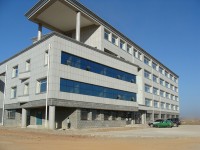 Pyongyang University of Science and Technology (PUST) is one of the more ambitious international ventures in North Korea of the last few years.
Pyongyang University of Science and Technology (PUST) is one of the more ambitious international ventures in North Korea of the last few years.
Almost ten years in planning, PUST is the country’s first privately-run university and backed with funds from evangelical Christian organizations in the U.S. and overseas.
It currently has several hundred students and guest lecturers make semester-long commitments to PUST and travel from overseas to teach students.
One such lecturer, Will Scott from Washington state, has just returned from the university.
Through a series of posts on Reddit and in emails with North Korea Tech, Scott provided a glimpse into what it’s like to teach at PUST and some of the technical aspects of Internet access in North Korea.
Part one of this story looks at life at PUST and the problems of teaching Computer Science without access to the Internet. In part two, coming tomorrow, a look into the IT environment at the university and the day-to-day hassles of getting online. Part three takes a look at Red Star Linux, North Korea’s own operating system.
Scott taught at PUST during the fall 2013 semester, from October to December.
The university hosts several hundred students at a time, studying subjects centered on science and technology.
“Many of the students were at the university more for the chance to get to interact with foreigners than for the specific major they were in,” said Scott. “You could tell sometimes when they would get really excited to sit with you at meal times, or when they got really excited about things like soccer or other sports.”
Lecturers were free to bring up most subjects in discussion, but reminded to be cautious, he said.
“Talk about your major subject, and it’s okay to answer questions and talk about topics the students bring up. Sports and Dating were safe topics if you needed to start a conversation.”
“The stuff we said did get reported though, so if you start talking about how great the US is or trying to argue with their government policies, that would probably get reported by the students to the administration and someone would talk to you to and tell you to tone it down.”
During his time as a lecturer, he got to make weekly visits to a local supermarket and go on some excursions. One was to the West Sea Barrage in Nampo, a major civil engineering project undertaken by the North Koreans.
“When we went to the coast a couple of us walked back up the road to take pictures of the main dam and got yelled at by some policemen and told to delete the pictures. Basically, that’s the sort of situation where you could get in to trouble, and you just don’t have a good sense of how serious it is. Luckily it was minor.”
“The lingering fear was worrying if any of my internet actions were going to draw the ire of someone looking at them. I’m a networking student so I was poking around to see how stuff was connected and was always on edge that it was going to get me in trouble.”
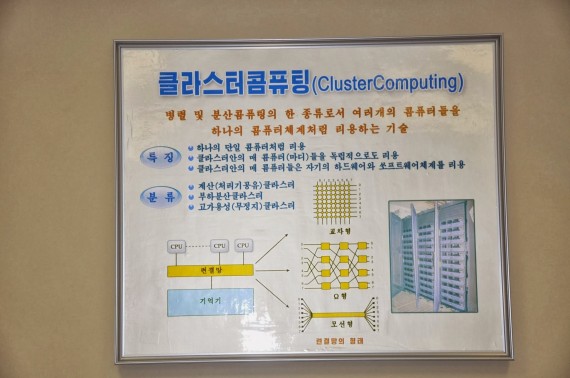
A poster describes the basics of cluster computing to students at Pyongyang University of Science and Technology (Will Scott)
The students at the university used Dell computers with Intel Core-Duo chips inside, he said. Most were running Windows XP but there was a newer computer with Windows 7. Both operating systems are previous generations of Microsoft’s Windows with XP officially not supported from April this year.
“The graduate students had laptops that dual booted Windows XP and Red Star, the DPRK’s proprietary RedHat Linux-based OS.”
Red Star version 3.0 is apparently the latest version.
As for the teaching, Scott has this to say:
“A lot of CS education really breaks down without access to the Internet,” he said. “A lot of the debugging process and figuring things out and being self sufficient boils down to Googling and finding stuff online. It made a lot of the assignments end up feeling like I was spelling everything out and still having to answer a bunch of questions.”
So, would he like to do it again?
“I’d like to go back at some point, but I don’t think I’d stay over there for years at a time – it’s hard to do research in CS without consistent power and the Internet.”

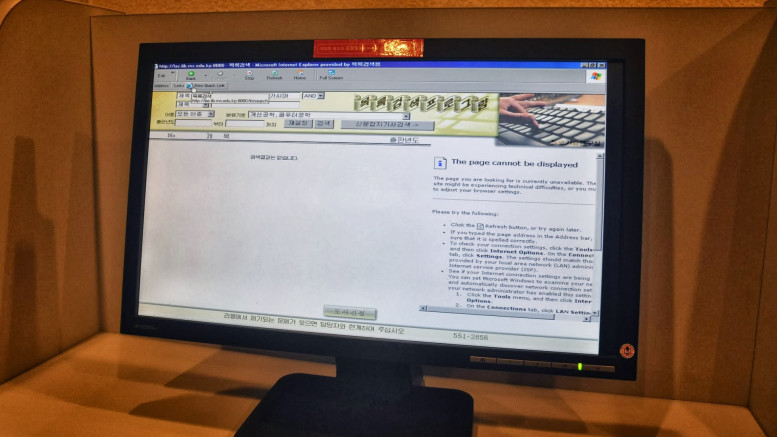
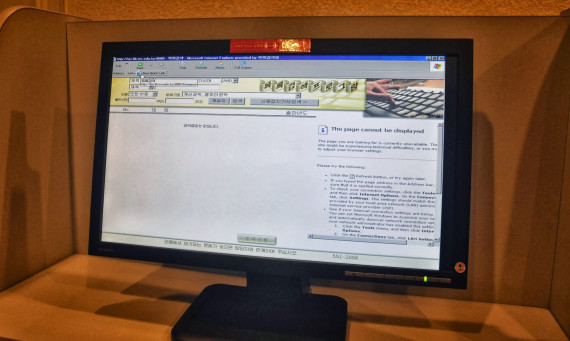

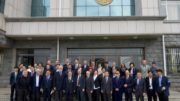
Aside from Red Star, did he get to use any NK programs/software? I’ve used a couple of things in SK – I’d be interested to hear his thoughts if he did. No doubt it’s too late to ask that!
http://youtu.be/KnBuzVOaMIw This is a video about my experience at PUST.
Beautiful video. Amazing how those young boys can speak perfect English. Boys: “if you think knowledge is too hard, try the ignorance”. Learning and studding science is definitely they key for a better individual and a better DPRK.
And beside of that, I’m talking from Rio de Janeiro Brazil, and here we are having another football world cup Similar to yours, but in a professional scale.
FAAP is the University where i graduated, in Brazil.
Writing from Rio de Janeiro, Brazil
Professor Leonardo Guarita
Will, what did you do/where did you go to receive this opportunity? I would like to do basically the same thing as my career, except with a different subject, and I would like some information on how you were able to teach in the DPRK.
Admision process? And fee of course.